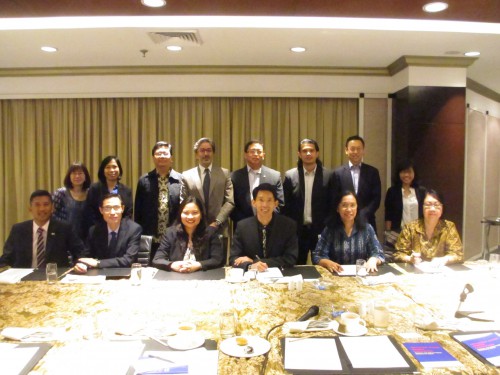9th December 2014 Singapore
How the South East Asia Prosperity Fund is helping in the fight against corruption
Today marks International Anti-Corruption Day which is a great opportunity to share more about some of the work that Southeast Asia Prosperity Fund supports. Since its inception in 2011, nearly a fifth of the Prosperity Fund’s grants have gone to projects to better enable transparency in government and businesses; reflecting the importance of combating corruption in the region.
The World Bank estimates that cost of corruption equals more than 5% of global GDP and that corruption adds up to 10% to the total cost of doing business globally, and up to 25% to the cost of procurement contracts in developing countries. In the region, it is a mixed bag, with the recently released 2014 Corruption Perception Index by Transparency International ranking countries from 7th (Singapore) to 156th (Cambodia, Burma), as the info graphic below shows.
The projects the Prosperity Fund supports cover wide ground, from sharing the UK experience in implementing the UK Anti-Bribery Act, to working with international transparency initiatives like the Extractive Industries Transparency Initiative (EITI) and Open Government Partnership (OGP). We also fund projects that help governments streamline processes to reduce opportunities for illicit enrichment, as well as projects that build the collective voice of businesses against corruption.
But enough said from me, it is best to let the projects speak for themselves, here’s two examples:
The ASEAN CSR Network: Integrity Has No Borders
by Jerry Bernas, Programme Director, ASEAN CSR Network
August 2013 saw the launch of the ASEAN CSR network’s project to better enable business networks to prevent and combat corruption through collective action. This has seen organisations across ASEAN member states come together to play an active role in combating corruption.
The United Nations Office on Drugs and Crime (UNODC) and the UN Global Compact (UNGC) have been providing valuable technical advice and expertise to the initiative, achieving one of the project’s main aim of promoting awareness and uptake of international standards and frameworks for addressing corruption, including the UN Convention Against Corruption (UNCAC) and the UN Global Compact 10th principle against corruption.

In February 2015 we will launch the ‘Integrity Has No Borders’ campaign which is our first major public outreach initiative which will target individuals and businesses. The campaign is particularly timely as ASEAN’s goal for 2015 is for economic integration across the region. Find out more about our work here.
The Indonesian perspective
By Nofa Lestari, Prosperity Fund, British Embassy Jakarta
From strengthening monitoring capacity towards local procurement in Indonesia to combating the usage of ‘facilitation payments’; the British Embassy Jakarta supports the fight against corruption in a number of ways.
Indonesia’s national anti-corruption strategy is strong on paper but there are gaps in implementation. Bribery and corruption often take the form of additional illegal tariffs and payments on businesses and individuals. The Corruption Eradication Commission’s (KPK) impressive track record, despite limited manpower and resources, is instilling some confidence that large scale corruption will be tackled and is having a deterrent effect by raising the profile of corruption.
With the new government taking place, anti-corruption, transparency and e-government efforts are better facilitated, signalling positive commitment for the adoption of transparency and good governance principles in government.
We have seen our share of small victories, including guidance issued by the KPK about the Private Sectors’ Role in Preventing Corruption and assistance provided to the Jakarta government to produce regulations that are expected to enhance the transparency and accountability of public procurement system.
We have also supported the development of an online monitoring website that tracks local government procurement (www.opentender.net). The website included standardised monitoring indicators alongside guidance for identifying high risk projects to be monitored and/or investigated further.
We believe that, together with the many organisations we partner, our work has contributed to Indonesia’s improved standing from a ranking of 114th in 2013 to 107th in this year’s Corruption Perception Index.
What you can do
These examples only provide a small slice of the much wider work that goes on beyond the scope of the Prosperity Fund – within the UK government, from colleagues in DFID and the Anti-corruption and Transparency team in the Foreign Office, to the international community– from the UNODC, UNDP and the OECD, to the many international development agencies and development banks.
Click on the image below to find out how you can support the global campaign against corruption and help break the corruption chain.
Alternatively, if you have ideas for projects that help promote transparency in government and business here in the region, get in touch or submit an application to the South East Asia Prosperity Fund. Read more about our call for bids here. Applications for funding close on 9 Jan 2015.